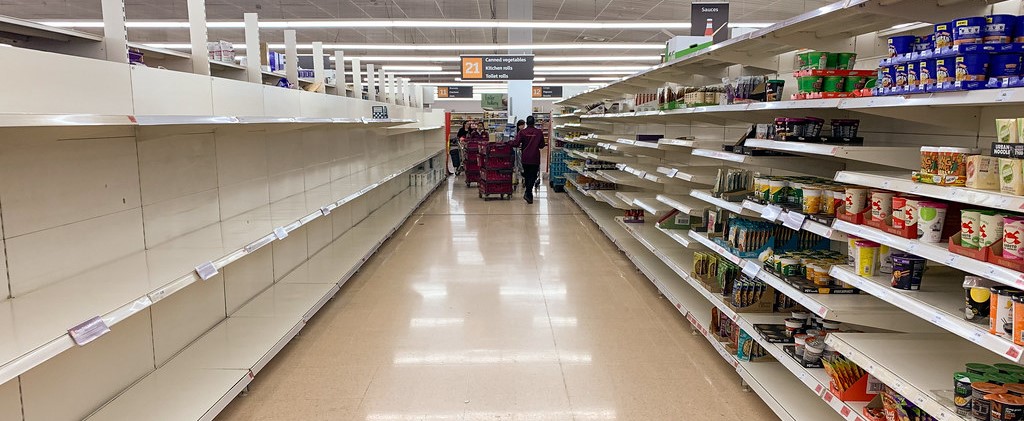Food systems impacts of COVID 19
Food systems impacts of COVID 19
Posted by Steve Guilbert
20 July 2020
Prof. Michael Winter OBE – Principal Investigator
I originally wrote the research proposal that led to the funding for this project in early April, at the height of concern over the impacts of COVID-19 on food supplies. Empty supermarket shelves for particular items, such as flour, were receiving wide media coverage alongside reports on the impacts of labour shortages and the closure of restaurant and similar outlets. There was also speculation that the supermarkets would not cope in the weeks to follow and that new, shorter supply chains would emerge rapidly in response. Three months on, it is clear that many of the dire warnings made in March and April have not materialized in the stark terms used by some commentators in the early stages of the crisis.
Indeed, in many ways, the food supply chain has demonstrated a high degree of resilience. The recent BBC 2 documentary, Keeping Britain Fed, was a paean of praise for the supermarkets and the Just-in-Time system. Workers in stores, distribution centres, and delivery vans were lauded, rightly so, for their dedication and hard work. The praise extended to factories that had adapted their production lines – a sausage manufacturer in Northern Ireland, a flour mill in the north of England – and again workers were praised for their efforts on behalf of the nation. Of course, good news stories really are only part of the picture and, good news in some businesses may well be the mirror image of bad news elsewhere: home-made toad-in-the-hole benefitting the flour and sausage manufactures at the expense of MacDonald’s burgers or KFC chicken. And certainly not all commentators have followed the ‘good news’ line. On the 24th June, Ellie Simmonds of Which? argued that “the fragility of our food and drink supply chains has been laid bare thanks to the coronavirus pandemic. The unforgettable images of empty supermarket shelves when coronavirus first hit the UK showed just how vulnerable our supply chains are to even slight fluctuations in supply and demand. It might be easier to get hold of baked beans and flour now, but the disruption isn’t over. Just last week, Marmite said its supplies have been hit by a lack of yeast, while soy sauce is in short supply due to a shortage of bottles, and 30 food and drink bodies have warned that COVID-19 has laid bare ‘inherent weaknesses’ in the resilience of the UK food supply chain”.
So what do we make of two such contrasting story lines? I would argue that both are true. Through sheer hard work – by delivery drivers, warehouse staff, factory workers, logistics experts etc, – there were indeed remarkably few shortages in those critical weeks of April and May, and this is/was all the more remarkable given the very different pattern of demand arising from the sudden switch-off of the hospitality sector. But at the same time there are underlying fragilities and vulnerabilities which are systemic. These vulnerabilities were expertly set out by Philip Garnett, Bob Doherty and Tony Heron, all from the University of York, in a paper in Nature Food in June: “Despite advances in supply chain technology and logistics” the York team argue that Just-in-Time efficiency “has paradoxically made supply chains more vulnerable to disruptions”. Moreover, a reduction by retailers in the diversity of the supplier base, means we are ever more dependent on fewer and fewer geographical places for particular commodities. But it’s not only system fragility that is a cause of concern in the contemporary food system, there are also fundamental issues of how fair and equitable the system is for producers of food and for consumers and how much it is contributing to the nation’s health challenges around obesity and related diseases.
Our project cannot possibly deal with all these issues. What we plan to do is provide an overview of some of the challenges faced by the food system as a result of the pandemic and to do some case studies of adjustment within particular sectors. I was struck by what one of our Expert Panel members said to me in conversation a couple of weeks ago: “the problem is that food system resilience is a black box, we don’t fully understand why it works or know all the inter-dependencies that are critical for particular sectors”. Hopefully our project will shine a light into the black box to increase our understanding of at least some of the challenges and opportunities thrown up by COVID-19.
Michael Winter, July 2020